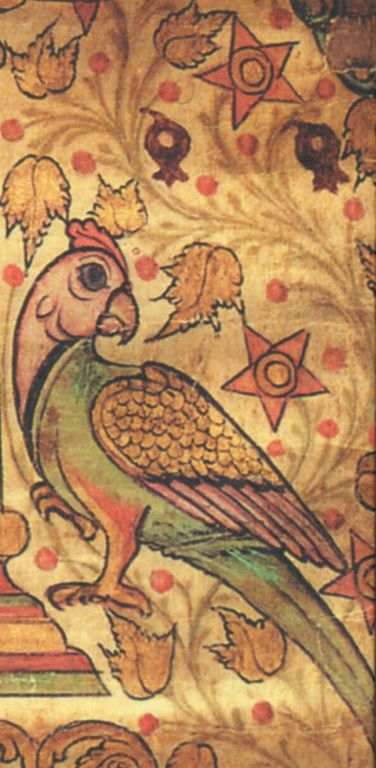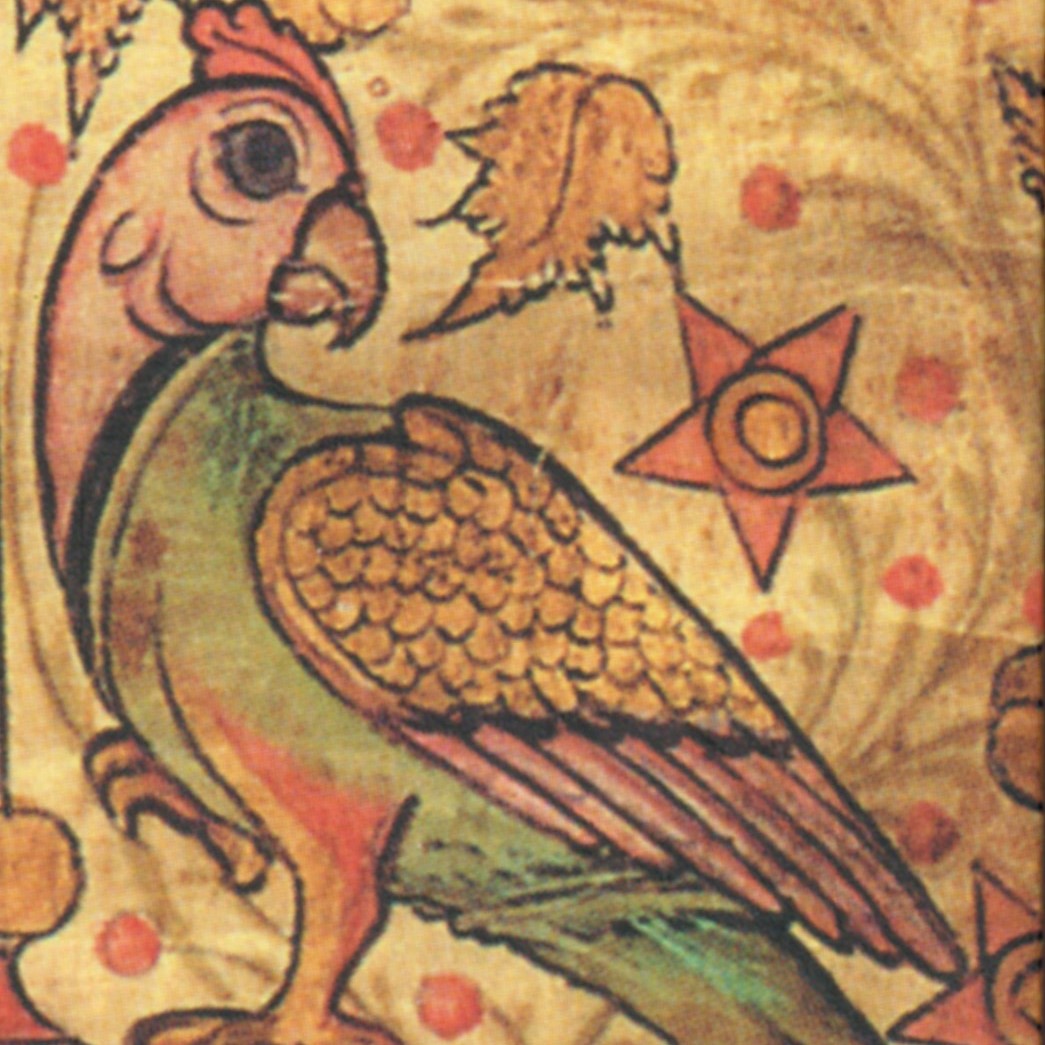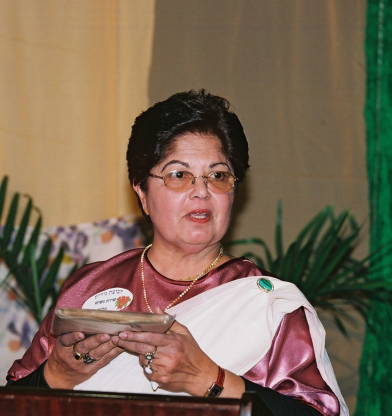2001
32. Prosper, Prosper (Our Bridegroom, Our Bride)
Rahel Kala, Venus Lane. Recorded at NSA studio, August 19,2001. CD track 6; II-16.
Ñaṅṅeḍě maņavāḷan, nīrāḍān pokuṃba
Āya maḻayo nī anneraṃ pěyyātě
Part I
1. Our bridegroom, our bridegroom—when he goes to take his bath,
O rain, we beg of you, oh please don’t fall just then.2. Our bride, our bride—when she goes to take her bath,
O rain, we beg of you, oh please don’t fall just then.3. The best man, the best man—while going along with him,
The best man attending him also should not get wet.4. The bridesmaid, the bridesmaid—while going along with her,
The bridesmaid attending her also should not get wet.5. The ring on the finger—it also should not get wet.
On the bangle-clad wrist, oh don’t let the bangles shake.6. The chest spread with sandal paste—don’t let the chest get wet.
The breast draped with flowers—oh don’t let the breast get wet.7. And who is the one who will go hunt and catch the deer?
“I’ll catch it; I’ll catch it,” the bridegroom declares.8. And what is the mark on the deer that you catch?
“The deer is a spotted deer, with many spots.”9. And who is the one who will slaughter the deer?
“I’ll slaughter, I’ll slaughter it.” So says the groom.10. And who is the one who will cut up the deer?
“I’ll cut it; I’ll cut the deer,” so says the bride.Part II
Same melody1. Polika, oh prosper in the wedding shelter.
Polika, prosper, O Chirianandan.[1]
Polika, increase, in number and heart.
Polika, multiply the children of the groom.
Polika, multiply the children of the bride.2. Entering your palace, may wife and children prosper.
Kindle the evening lamp; drive away the darkness.
Go now and light the lamp inside the palace.
If there is supper or if there is breakfast,
Great possibilities are half-sleeping there.
Hanging lamps and chained lamps are inside, burning,
And also the brass lamp made by the metalsmith.
May the bangle-clad wrist and the bangles not tremble.
May the ringed finger also not tremble.
May the breast spread with sandal paste also not tremble.3. You, adorned with flowers as a head-covering,
You, wearing jasmine and magnolia flowers,
You, wearing jasmine and wearing magnolia!
Knock and open: the jasmine-breast fragrance!
Push and open: the magnolia fragrance!
Enter and open: perfume of rose and sandal!4. In silken garments they are splendidly clothed.
On their feet are slippers of diamonds and pearls.
One thousand servants serve in their palace.
Their palace will lock with one thousand locks.
Their palace will open with one thousand keys.
Achi-unni, lovely darling, who lives in the palace!
She walks with dignity on slippers of gold,
On slippers of silver, she elegantly walks.
This joyous and playful song exemplifies two widespread genres of Kerala folk music. Part I begins in the style of a “competition song” (vāśippāṭṭtu), in which two singers or groups of singers perform alternate stanzas (Zacharia 2005,199), and part II begins as a typical “prosperity song” (pŏlikappāṭṭu), calling for “increase” or prosperity in the context of agricultural celebrations and varied Hindu religious rituals in Kerala (Aju Narayanan 2006). Our English version is a composite translation of part I, performed by two women from the Paradesi community in Kochi, combined with part II, found in notebooks from Kochi and Parur.[2]
Ruby Daniel describes how the song was traditionally performed in the Kochi-Paradesi community, during a party on the day after the wedding for non-Jewish friends and neighbors of the wedding party and sometimes tenants “who lived on the land owned by the families.” The bride and groom were seated on a stage, with Jewish women on opposite sides singing as the guests presented wedding gifts. For this song, the women alternated verses about the bride and the groom, and they also improvised verses of praise to the donors of gifts (Daniel and Johnson 1995, 182–183).
Varghese (2005, 46) describes a similar occasion during the cycle of traditional Syrian Christian weddings in Kerala, in which relatives of the wedding couple sat on a stage, with singers from the bride’s family on one side and singers from the groom’s side on the opposite side. Ananta Krishna Ayyar (1926, 84) also describes the Christian custom, noting that on this occasion, small contributions of money for the expenses of the wedding are referred to as “poli.” Both Narayanan and Daniel mention the practice of improvising verses for polika songs; their comments shed light on the range of different verses in the Jewish song variants.
In terms of content, the reference to a deer hunt in part I can be compared to a similar reference in the Song of Evarayi (song 2), and it also evokes Swiderski’s reference to hunting as a symbol of royal prosperity in Kerala Christian folklore (1988a, 70). Further parallels are found in other Syrian Christian wedding songs from Kerala—both the “Bathing Song” with its references to the flower-decorated hair, the chest spread with sandal paste, and the bride walking slowly on sandals of silver (Varghese 2005, 57; Lukas 1992, 15–16); and the “Close and Open” song, which portrays female relatives of the bride knocking “with happiness and gaiety” on the door of the bridal chamber (Varghese 2005, 56; Lukas 1992, 14–15).
As for the reference to Chirianandan in the first stanza of part II, this is an honorary title of uncertain meaning, ascribed in some of the old Jewish Malayalam “copper plate songs” to the legendary Jewish ruler Joseph Rabban.[3] Here it seems to be used as a title for the bridegroom—perhaps confirming A.I. Simon’s statement that in the past, some Paradesi women used the term in that way (1947, 15).
In addition to illustrating the depth of Jewish participation in Kerala folk culture, this song contributes particularly evocative poetic imagery in its royal portrayal of the bridal couple entering the palace of their marriage chamber.
My thanks go to Dr. Nandini Ramesh Sankar for her appreciation of this song and her help with the translation.
__________________________
[1] For the term polika and for this honorary title, here applied to the bridegroom, see the commentary below.
[2] The two parts were textualized by Zacharia as three variants of one song “Prosper, Prosper” (2005, 117–120, songs 44, 45, 46).
[3] Regarding Joseph Rabban, see the commentary on song 5.







